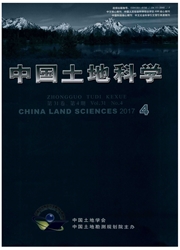

 中文摘要:
中文摘要:
研究目的:探讨城中村改造中原住民和外来租客的福利水平,为平衡和改善福利效应提供借鉴。研究方法:基于阿马蒂亚·森的可行能力理论,以城中村现行补偿缺陷为出发点,运用功能性活动分析,从人本尺度和福利平衡两个角度探索。研究结果:城中村外来租客被排除在利益主体之外,原住民的福利模式陷入效用化的单一经济补偿陷阱,总体福利补偿存在较大缺陷,亟需进一步提升和完善补偿机制。研究结论:拓宽改造补偿对象,把外来租客纳入福利补偿主体之内;采用多维福利补偿模式,以提高人的可行能力为重点,最终促进城中村改造和城镇化的协调发展。
 英文摘要:
英文摘要:
The purpose of this paper is to explore the welfare level of the local residents and the tenants during the reconstruction of urban village, which provides references for balancing and improving the welfare. Based on Amarty Sen.’s theory of capability, this paper analyzed the current compensation policy in the urban villages and studied the humanistic scale and welfare balance with functional activities. The results indicated that the tenants were excluded from the stakeholders and the welfare model of local residents only concentrated on economic compensation. This welfare compensation needs further improvement. This study confirms that it is necessary to put the tenants into the group of compensation and use a variety of welfare compensation models, which will greatly promote the welfare of balance, and ultimately contribute to the overall development of urbanization.
 同期刊论文项目
同期刊论文项目
 同项目期刊论文
同项目期刊论文
 期刊信息
期刊信息
